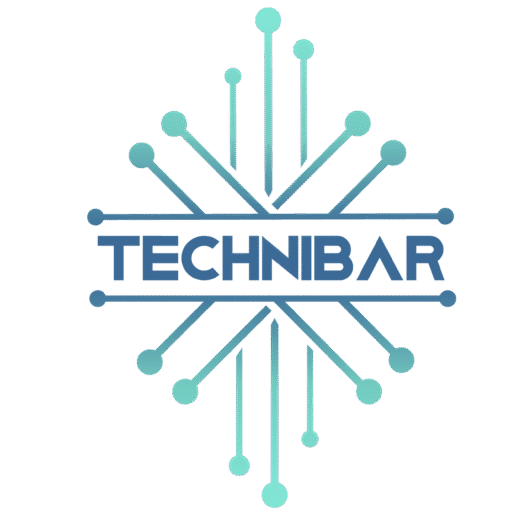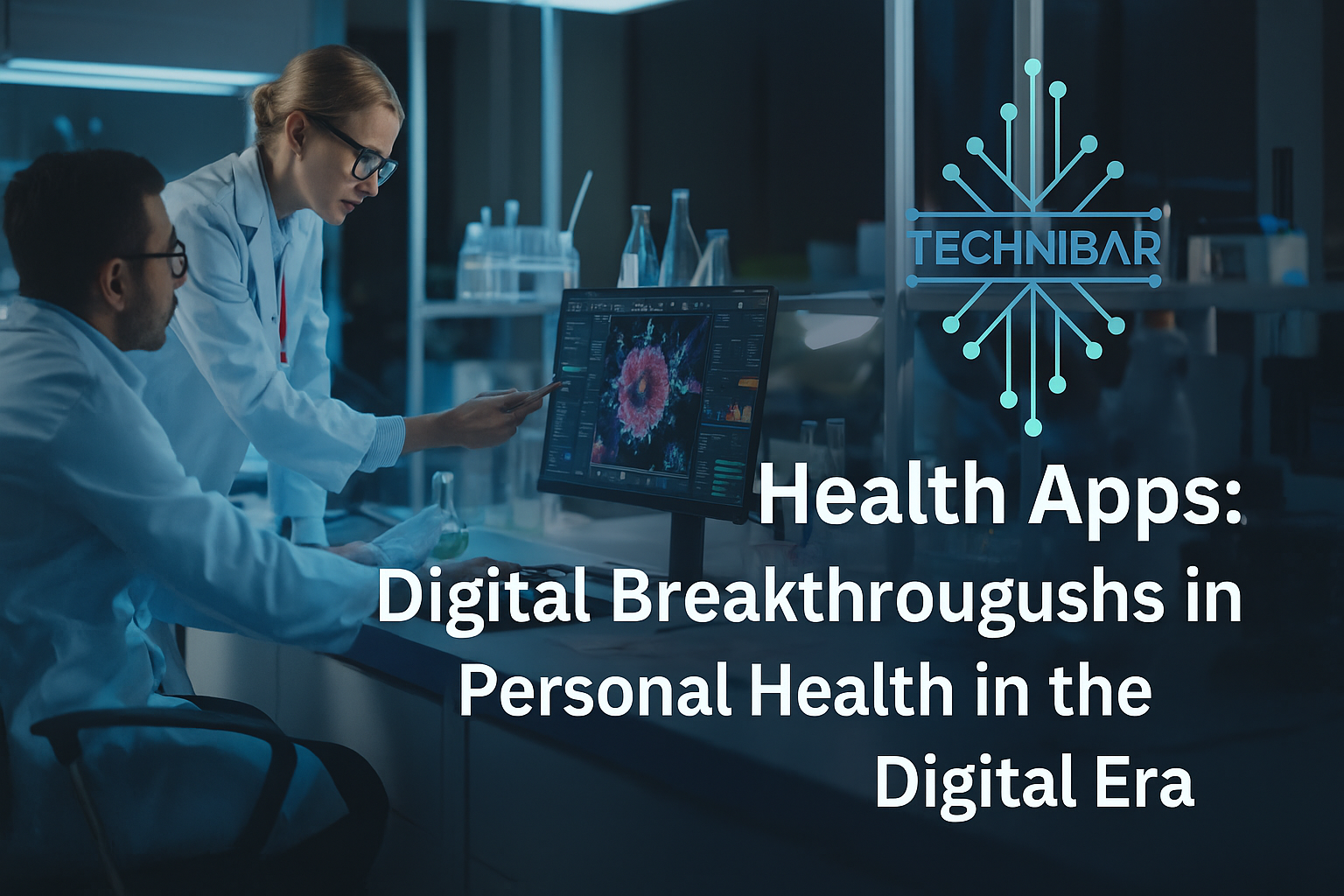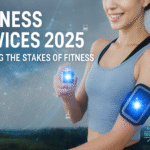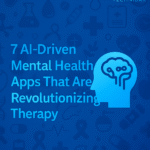Merging in the previous decade, the advent of digital technology and smartphones has introduced a tremendous change to how individuals go about their personal health and wellness. The popularity of health apps is one of the most striking trends as these tools have become an essential asset of millions of people who will do anything to live a healthier lifestyle. These apps provide a plethora of services-including tracking fitness and dieting, supporting mental health, and managing chronic illnesses among others-and make healthcare more convenient and customized than ever before.
Define Health app:
A health app is a mobile application used to track, manage, and display their personal health and fitness information, and many health apps include data drawn from multiple sources such as wearable devices and other applications. Such applications assist individuals in tracking their activities, including steps taken, distances covered in sports, and such similar activities and this offers convenience to access health-related information and statistics.
How health app work
A health app can be used in conjunction with a mixture of user-provided information, built-in smartphone sensors, external hardware (such as fitness bracelet) and software algorithms in order to aid users in monitoring, managing and optimizing their health. Simply, this is how a health app operates.
User Input:
The most health apps begin with gathering the regular data about the user, including:
- Dates of birth, heights, the weight and gender of individuals
- I AM/Level of activity and Fitness target
- Eating habits or diets
- Pre-existing medical conditions (e.g. diabetes, hypertension)
- Drugs or physiologies
Users can also track daily information like:
- Dieting (meals and calorie take)
- Physical exercise (Steps, Exercises)
- Water consumption
- Sleep patterns
- Mood/stress levels
The major characteristics of the health app:
A health app must have secure user portfolios, wearable device connectivity to personalize user health monitoring, activity and goal logging, medication reminders, a telehealth doctor appointment/ consultation functionality, an intuitive user interface, and a high level of data security and privacy to preserve the confidentiality of health information.
Patient Features Core:
Custom Health Profiles
Users can create in-depth profiles, track their goals, and track activities in areas such as activity, sleep, and nutrition.
Appointment Management
Enables users to set, organize and get notifications on appointments with the healthcare providers.
Livestock Video Consultation with the Professional
In the sphere of health, one does not prefer to take chances; and the element of a live scientific conference with experts would be welcome in such a case. With the selection of the video consultation elements, one can talk to the specialists online. As different internet researches show, applications that have this feature have more likelihood of success in the healthcare industry.
Wearable Device of health app
Real time health tracking:
Connect to smart watches and fitness trackers to automatically collect such types of data as heart rate, sleep patterns, step counts, and oxygen levels.
Active Health Management:
Use this real time data to prescribe early interventions, give physical activity detail, and assist users to manage their health better.
Top Health Apps in 2025: Features, Benefits & Comparison
In today’s fast-paced world, health apps have become essential companions for managing fitness, diet, sleep, and overall well-being. From calorie counters to meditation guides, these apps empower users to stay healthier, more active, and better informed about their bodies.
Below are some of the most popular health apps in 2025, followed by a detailed comparison table.
1. MyFitnessPal
MyFitnessPal is one of the most widely used calorie and nutrition tracking apps. It comes with a massive food database of over 11 million items, making meal logging simple. With its barcode scanner and macro-tracking capabilities, users can closely monitor calories, proteins, carbs, and fats. The app also integrates with fitness wearables like Fitbit and Apple Health, giving a complete view of diet and exercise.
2. Fiton
FitOn is a free workout app offering classes across HIIT, yoga, Pilates, and more. Unlike most competitors, it provides celebrity-led workouts and community challenges at no cost. FitOn also allows group classes, so you can exercise with friends virtually. The app does have a premium plan, but even the free version offers more than enough for beginners and advanced users alike.
3. Nike Training Club (NTC)
Nike Training Club delivers professional trainer-led fitness programs designed for strength, mobility, yoga, and endurance. The app provides structured 4–6 week workout plans and hundreds of on-demand classes. Best of all, it’s completely free with no ads, making it one of the best apps for guided workouts at home.
4. HealthifyMe
HealthifyMe focuses on personalized diet and wellness coaching. Popular in Asia and beyond, the app offers a large food database with regional cuisines, an AI assistant named “Ria” for real-time nutrition advice, and access to certified trainers and dietitians. For those serious about weight loss or healthy living, HealthifyMe provides an excellent blend of tech and human coaching.
5. Flo
Flo is a leading women’s health app, trusted by millions to track menstrual cycles, ovulation, and pregnancy. With AI-powered predictions, mood logging, and a supportive anonymous community, Flo helps women understand and manage reproductive health better. It also offers pregnancy mode, which tracks fetal growth and provides expert-backed health insights.
Comparison Table of Top Health Apps
| App | Best For | Key Features | Free/Paid Model | Device Integration |
| MyFitnessPal | Nutrition & calorie tracking | Huge food DB, barcode scanner, macros, AI meal insights | Free + Premium ($9.99/mo) | Fitbit, Apple Health, Garmin |
| FitOn | Free workouts & group training | Celebrity trainers, group classes, HIIT, yoga, community features | Mostly Free, optional Premium | iOS, Android, Chromecast |
| Nike Training Club | Structured fitness at home | Strength, yoga, mobility, 4–6 week plans, trainer-led videos | 100% Free (premium removed) | Apple Watch, Apple Health |
| HealthifyMe | Diet & fitness coaching | Indian food DB, AI coach Ria, virtual trainers, calorie tracking | Free + Premium coaching | Fitbit, Apple Health |
| Samsung Health | Overall health tracking | Activity, sleep, stress, heart rate, fitness videos | Free (pre-installed on Samsung devices) | Galaxy Watch, Smart TVs |
| Flo | Women’s health & fertility | Cycle & ovulation tracking, pregnancy mode, AI predictions, community | Free + Premium ($9.99/mo) | Apple Health, Google Fit |
| Fitbod | Gym strength training | AI adaptive workouts, recovery tracking, equipment-based customization | Paid (trial available) | Apple Watch, Strava |
| Fastic | Intermittent fasting | Timer-based fasting, meal planning, hydration tracker, streak motivators | Free + Premium ($11.99/mo) | iOS, Android |
| Withings & Cardiogram | Medical-grade health data | Smart device integration, ECG, sleep, heart analysis, BP monitoring | Free app, devices sold separately | Withings devices, Apple |
| Headspace | Mental health & sleep | Meditation, mindfulness, sleep sounds, stress management | Free basics + Premium ($12.99/mo) | Apple Health, Fitbit |
Benefits of health app:
These health apps are useful in that they provide convenient access to health information and medical records, better patient engagement thanks to personalized education and monitoring and they are more efficient to both the patient and the provider through features like scheduling your doctors and prescription refills. They enable improved health self-management due to self-monitoring tools and can afford accessible services remotely, which would also cut healthcare expenses through a decreased frequency of in-person visits.
Security
End-to-End Encryption:
Encrypts data in transit (using TLS) and when storing it (at rest) to make it unintelligible unless the appropriate keys are used to decode it.
Secure Coding Practices:
Security is one of the building blocks of the developers of the app.
Role Enterprise Role-Based Access Control (RBAC):
Controls access to sensitive data in consideration of specific user role and authorization.
Example of health app:
Examples of such health apps are MyChart that allows retrieving personal health records, Headspace, and Calm aimed at meditation and mental health improvement, MyFitnessPal and Fitbit intended to track fitness and diet, Teladoc and Doctor on Demand apps used to access telemedicine, and Medisafe that is utilized to manage medications.
Mental Health & Meditation Apps
Headspace:
Provides a guided meditation and mindfulness practice.
Calm:
Offers relaxation and sleep stories, as well as meditation exercises.
Talkspace:
This links individuals to certified counselors who provide an online counseling session.
Conclusion
Health apps provide magnificent potential to solve the problem of enhanced patient engagement, better health outcomes, and healthcare delivery as a whole: allowing individuals to better control their own health, communication between providers, and living healthier lifestyles. Although promising, issues such as privacy concerns regarding the data collected, the possible increase in physician workload, and desire to see more evidence supporting their efficacy, still exist, indicating that changes to these digital tools are likely in development and require provisions of regulatory oversight to ensure a safe work environment and experience of the user.
FAQs About Health Apps
1. Are health apps reliable for tracking fitness and nutrition?
Most popular health apps like MyFitnessPal, Samsung Health, and Nike Training Club are reliable for general fitness and nutrition tracking. However, they should not replace professional medical advice. They are best used for lifestyle management, motivation, and habit tracking.
2. Which health app is best for overall wellness?
For all-round wellness, Samsung Health and HealthifyMe are great choices as they cover activity, diet, sleep, stress, and heart rate. Apps like Headspace also add mental wellness features that complement physical health.
3. Do I need to pay for premium health apps?
Not necessarily. Apps like Nike Training Club and FitOn offer excellent free versions. Premium subscriptions usually unlock advanced insights, personalized coaching, or ad-free experiences, but casual users can benefit greatly from the free plans.
4. Are health apps safe for storing personal health data?
Most leading health apps use encryption and comply with data protection laws like GDPR and HIPAA. Still, it’s important to read the app’s privacy policy and avoid sharing extremely sensitive data unless necessary.
5. Which health app is best for weight loss?
For weight loss, MyFitnessPal and HealthifyMe are considered top apps due to their calorie tracking, macro breakdown, and personalized meal coaching. Pairing these with workout apps like FitOn or Nike Training Club increases effectiveness.







